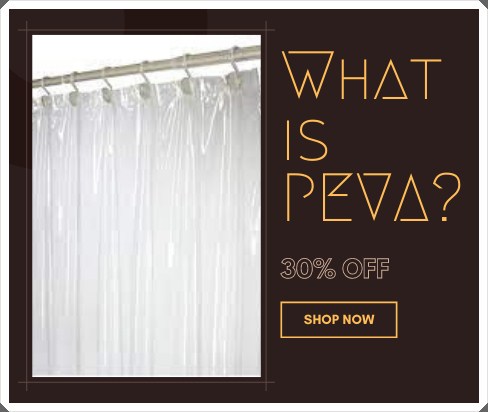
Conventional shower curtains are made of polyvinyl chloride or PVC. Although PVC is practically all around us, it is one of the most toxic types of plastic.
As its name implies, PVC includes chlorine, which creates by-products called furans and dioxins. These are very toxic chemicals. According to the World Health Organization (ESO), dioxins “can create reproductive and developmental problems, damage the immune system, disrupt hormones, and create cancer cells.”
Not only that, but PVC almost always consists of phthalates (which are use to make the plastic more flexible). Phthalates are endocrine disruptors, which can hamper natural hormone function and cause the inability to conceive and develop toxicity. They’re also linked to diabetes and asthma and can also cause cancer.
To make matters worse, heat can drive these and other unstable naturally occurring substances (VOCs) out of plastic, meaning you’re likely to breathe in small amounts every time you take a warm shower. These chemicals can build up in the air over time, increasing indoor air pollution and negatively affecting your and your family’s health over a long period.
What is PEVA used for?
Shower curtains are perhaps one of the most common vinyl acetate and polyethylene products seen in most homes. Traditionally seen, chloride plastic was use instead of PEVA in almost all shower curtains.
Customers’ assumptions have primarily morphed in recent years much more toward making healthy choices about a way of life. Once again, the vast majority of users are now aware of the risks related to PVC articles.
PEVA shower curtains have recently been a more standard product than their other PVC equivalents. This is mainly because they can be much more eco-friendly and free of odors.
Children’s toys, footwear, make-up bags, children’s bibs, table treatments and fabrics, vehicle covers, bed mattress covers, and occasionally electric heating systems are specific examples. everyday household items that may include PEVA.
Some other examples are professional sports activities equipment, such as soccer cleats, professional baseball knee pads, bicycle bands, sports helmets, and sometimes also caps, as well as stickers, plastic mats, and adhesive labels Sneakers.
PEVA also has a couple of other uses. It is use to produce product package for other things. It is also use for the production of some textile materials and binding for publications.
It is more significantly known as a safer option than PVC. However, it is also used as an alternative to many other products ranging from wood to rubber and cork.
Read More : What is the ANT Radio Service? Do I require it?
Is PEVA safe?
In reality, no major conclusion has been reached regarding the safety of using PEVA products. However, PEVA has been a safer alternative to PVC products. This is due to the absence of chlorine used in the development process.
Some allergic comments have been reported by people who were unaware of their hatred of PEVA.
In terms of safety and security, the use of PEVA products is usually safe and eventually also depends on the discretion of the person using it.
PEVA shower curtains
These have all the desirable buildings of PVC shower curtains. However, unlike PVC products, they do not emit harmful gases or odors.
PEVA shower curtains are biodegradable and chlorine-free. This makes them one of the greenest remedies for your shower. Materials made from PEVA contain VOCs but at deficient and non-harmful levels.
In particular, PEVA shower curtains are waterproof, mildew resistant, and mildew resistant. They are straightforward to order, and you can also use them without lining. All you need to do is clean the shower curtain with a sponge from time to time.
PEVA materials are just as durable as PVC products. Thanks to vendors like Amazon and IKEA, PEVA shower curtains are not hard to come by.
Because they are significantly prefer, more and more PEVA shower curtain alternatives are being offer in the market. You should be able to find a PEVA shower curtain that matches the decorative style of your bathroom.
Various other alternatives to PVC
Hemp shower curtains
Hemp is hard to beat when it comes to eco-friendly materials. If safety is your main concern, hemp may be the best option. Hemp shower curtains may not be as helpful as PEVA shower curtains. However, they can be machine wash.
Hemp fibers are snugly intertwined to create a durable, water-resistant curtain. Note that it will absorb some water, but the water will not seep through as easily.
Hemp shower curtains dry quickly, and as long as you keep your bathroom well ventilated, you won’t have to worry about mold and mildew.
Unlike traditional plastic curtains, hemp will not trap moisture inside the tub. Hemp has a much longer shelf life than most other natural fabrics.
Cotton blend shower curtains
Cotton is the most popular fabric on the planet, so there are many cotton blend shower curtains. They dry quickly like hemp shower curtains and can be thrown in the cleaning machine.
While not waterproof or immune to mold and mildew, cotton blend shower curtains are as safe as possible, so there’s no fuming to worry about. Cotton blend shower curtains are much cheaper than hemp shower curtains and come in a more extensive selection of attractive styles.
Nylon shower curtains
Nylon shares some residential or commercial properties with both PEVA and natural textiles. It is not 100% waterproof like PEVA, but it is more water-resistant than cotton. Nylon is also less likely to grow mold and mildew than all-natural textiles.
Nylon shower curtains contain some of the same chemicals as PEVA shower curtains. Still, just like PEVA curtains, nylon curtains are safe to use. You can safely clean your nylon shower curtains in the washing machine. Nylon shower curtains are cost-effective and will last you long if you treat them right.
Leave a Reply